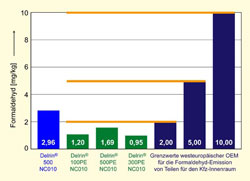New, low-emission grades of DuPont™ Delrin® meet leading automotive OEMs' requirements

Photo: DuPont <br>Testing by the SGS Institut Fresenius GmbH in Germany, in accordance with the VDA standard 275, confirms that all three low-emission grades of Delrin® are within the formaldehyde emission requirements of the leading automotive manufacturers.
As a result, the high performance acetal homopolymers, which are categorized by their viscosity, are well within the formaldehyde emission requirements of the leading automotive manufacturers, creating new opportunities for their adoption in automotive interior applications.
The new low-emission grades are globally available in three basic melt flow series: Delrin® 100PE, 300PE and 500PE, with Delrin® 100PE being the most viscous. All three have been specially formulated with an additive to substantially reduce their release of formaldehyde during processing and use to levels which meet even the most stringent of emission requirements demanded by today’s leading automotive OEMs. Subsequent testing of low-emission Delrin®, carried out by SGS Institut Fresenius GmbH in Germany in accordance with the VDA (Verband der Automobilindustrie) standard 275, confirms the outgassing of formaldehyde from all three grades to be below 2 mg/kg.
As well as an extremely low volatile release, the new low-emission Delrin® grades provide the same high mechanical performance as the standard grades in terms of its strength, stiffness, creep and fatigue resistance and impact strength. “Our achievement in developing the first acetal homopolymer to meet the emission standards of all leading OEMs, without compromising mechanical performance, will open up new opportunities for the cost-effective replacement of existing materials in many automotive interior applications,” says Hans-Hermann Kirner, automotive car interior development manager at DuPont. “These include, for example, components for safety systems, door panels and seats, where its unique combination of properties can be of great benefit.”
The DuPont Engineering Polymers business manufactures and sells Crastin® PBT and Rynite® PET thermoplastic polyester resins, Delrin® acetal resins, Hytrel® thermoplastic polyester elastomers, DuPont™ ETPV engineering thermoplastic vulcanizates, Minlon® mineral-reinforced nylon resins, Thermx® PCT polycyclohexylene dimethylterephthalates, Tynex® nylon filaments, Vespel® parts and shapes, Zenite® liquid crystal polymers and Zytel® nylon resins and Zytel® HTN high-performance polyamides. These products serve global markets in the aerospace, appliance, automotive, consumer, electrical, electronic, healthcare, industrial, sporting goods and many other diversified industries.
DuPont is a science-based products and services company. Founded in 1802, DuPont puts science to work by creating sustainable solutions essential to a better, safer, healthier life for people everywhere. Operating in more than 70 countries, DuPont offers a wide range of innovative products and services for markets including agriculture and food; building and construction; communications; and transportation.
The DuPont Oval, DuPont™, The miracles of science™, and Delrin® are registered trademarks or trademarks of E.I. du Pont de Nemours and Company or its affiliates.
Media Contact
More Information:
http://www.dupont.comAll latest news from the category: Materials Sciences
Materials management deals with the research, development, manufacturing and processing of raw and industrial materials. Key aspects here are biological and medical issues, which play an increasingly important role in this field.
innovations-report offers in-depth articles related to the development and application of materials and the structure and properties of new materials.
Newest articles

Parallel Paths: Understanding Malaria Resistance in Chimpanzees and Humans
The closest relatives of humans adapt genetically to habitats and infections Survival of the Fittest: Genetic Adaptations Uncovered in Chimpanzees Görlitz, 10.01.2025. Chimpanzees have genetic adaptations that help them survive…

You are What You Eat—Stanford Study Links Fiber to Anti-Cancer Gene Modulation
The Fiber Gap: A Growing Concern in American Diets Fiber is well known to be an important part of a healthy diet, yet less than 10% of Americans eat the minimum recommended…

Trust Your Gut—RNA-Protein Discovery for Better Immunity
HIRI researchers uncover control mechanisms of polysaccharide utilization in Bacteroides thetaiotaomicron. Researchers at the Helmholtz Institute for RNA-based Infection Research (HIRI) and the Julius-Maximilians-Universität (JMU) in Würzburg have identified a…



